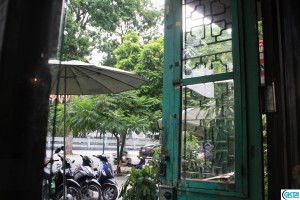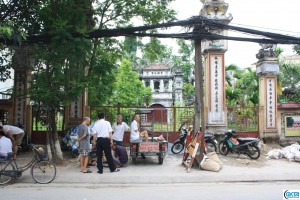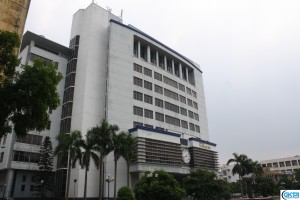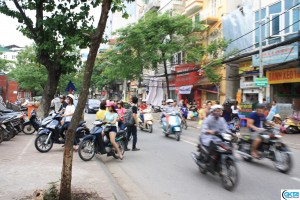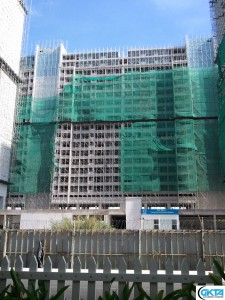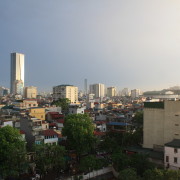Time In Vietnam
One of the biggest differences between this part of the world and the west is how long things take to get done. If something takes x amount of time over there then expect it to take 3, 4, or 5x as long here—unless you have a well-connected local partner to fast track whatever it is you are doing in terms of paperwork or approvals. That’s for Saigon; it’s an even slower pace in Hanoi.
A simple task such as ordering at a restaurant might go a little something like this:
Person A orders.
Wait staff repeats Person A’s order.
Person A confirms.
Person B orders.
Wait staff repeats Person B’s order.
Person B confirms.
Wait staff repeats the entire table’s order.
Person A and Person B confirm.
That’s assuming the wait staff understood the orders right the first time. Getting the correct order on the table is a different matter entirely. 🙂
Even the fast food here isn’t really “fast” food (in the traditional sense) since Vietnamese families often fill various franchises around dinnertime, spending more time than required to just pop “in-and-out” for a meal. It’s a bit of a “badge of honor” to be seen in a western establishment for the average Vietnamese family because it shows they can afford eating there. Combined with the coffee culture here, people spend hours inside F&B shops chatting, talking, operating on social media, and generally being seen.
So, time has a different pace and value here than back west. If you take things here at face value then you will run the risk of wasting a lot of your time.
When working with locals, a common trend is overpromising and under delivering—especially when it comes to deadlines. You should not believe that something is done to the required specifications until you have seen it with your own eyes and have had time to review/test it.
Missing five deadlines in a three month period is a very real possibility here (a real example) and after a certain point the old adage comes to mind, “Fool me once, shame on you; fool me twice, shame on me.”
Not everyone, but many locals here are focused on short term results which is evidenced by driving norms, etiquette (try stepping off a lift and you will see), and not doing things the “right way” the first time because it would simply take too long. Problems in a process are usually due to a lack of planning until it’s almost too late and then it’s rush, rush, rush!
Needless to say, communicating effectively can be very difficult here. You can explain something via phone, text, email, in person, whatever and it still might not be done the way you expected or wanted. Sometimes, people might tell you “yes” just to get rid of you or to save face or because they don’t understand what you are asking and are trying to be polite. Try to ask someone for directions and you’ll quickly understand how pointless it can be sometimes.
Short of learning the local language, speaking slowly, and rephrasing the major points go a long way toward reducing miscommunication. Hiring an interpreter is also an option but not the best long term strategy. The longer you stay in Vietnam the more seemingly strange things will start to make sense to you—but it’s a steep learning curve unless you take the time to research Vietnamese culture and history (and that includes learning the language). Asking local friends for clarification will help you understand Vietnam as well but be careful how you phrase your inquiry less you offend them.
To add to the language barrier frustration, you might have trouble figuring out what is true and what is false since everyone’s favorite English word seems to be “yes.” For example, if you ask a local colleague to sign off on some items that s/he was to have completed already the response you get might be affirmative but the task might not actually be done. “Trust, but verify” should be the mantra for westerners operating here or else you will become mad with frustration and waste valuable time.
Time here is abundant for many people; for example, a typical lunchtime might be 1.5 to 2 hours with eating, recreation, and napping. The heat and humidity can negatively affect productivity but the cost of labor is inexpensive so productivity is not as much of a concern as it is in the west. Locals could underappreciate your time when it comes to meeting start times and having you wait around for them. However, you shouldn’t show up late to a meeting because you assumed your counterpart has a polychromic view of time as well—not all locals are the same. There are also many temptations and distractions from professional life so it can be easy to slip into some bad habits that might not be so available or accepted in the west. Balance between work and personal interests as well between stress and relaxation are essential to being successful in Vietnam (and everywhere but, especially in Saigon, it seems easier to jump off the deep end for some people).
Some Vietnamese Phrases That May Save or Waste Your Time
“You need to move slow if you want to move fast.”
Meaning: Don’t pester the person you need to get something done or else they will dig their heels in and operate even more slowly to spite your perceived meddling Let them work at their own pace—in the end it will be faster and less stressful. If you are answering to westerners for a project then this could be a problem for you.
“You need to spend money to make money.”
Meaning: Vietnamese are attracted to those who they believe are successful. It might be real, or it might be an image. It could also be a fatalistic approach to justify whatever crazy scheme is going on. Finding out what is really going on could take a lot of digging and time—better to move on or do some circular research via mutual trusted contacts.
“In the end it will be okay so if it’s not okay then it’s not the end.”
Meaning: Largely an excuse for deflecting criticism or remaining unfazed by concerns that are presented. It could be the case if there are other unknown actors (usually family) who will swoop in to save the project in the final hour. It doesn’t sound like a promising result if that is their best strategy, right?
“Don’t need.” (“Cannot.”)
Meaning: You haven’t convinced a local decision maker that your suggestion is useful. Try a different approach because repeating yourself will just waste everyone’s time.
For example, when the founders of an online food ordering website here went around trying to get local restaurants to “install a machine that would print out orders from the internet” they eventually pitched it as “a salesperson you don’t need to pay.”
That resonated with restaurant owners and led to the adoption of the machine and their success. If you get a “no” the first time, then ask a different way or provide a range of options that you are willing to work with.
“Not your job, not my responsibility.”
Meaning: You are working with the crème de la crème! Cut your losses and move on (thereby saving your time). If that is not an option then you had better get into “CYA” mode.
Different Approaches for Different Situations
Whatever the situation, if you don’t get the response you wanted then ask someone who has been in Vietnam longer than you have for some feedback—chances are they will have some good suggestions for you. At the very least, “talking out” your problem will allow you to simplify it as you explain it to someone else. If that doesn’t work then as they say, “experience is what you get when you don’t get the results you wanted.”
Remember, the challenges you will be faced with while working here will be a culmination of differences—differences of visions, standards, expectations, of course languages and culture, and ultimately, opinions. Just keep in mind that it’s all a learning experience and a valuable education for what challenges might again lie ahead in the future when working in Vietnam (and you will already have part of the solution for the next time!).
Prepare to move slowly (budget, timetable, travel plans, etc.) but don’t waste time here since you won’t be able to get it back. Above all, the more time you spend in Vietnam, the more efficient you will become as long as you maintain your high standards and don’t try to change the whole country. Always remain patient, calm, and professional throughout every situation—even when those around you are not because it’s one of the best ways to ensure that you won’t have a bad time in Vietnam. After all, you’ll have peace of mind knowing that you did the right thing.


